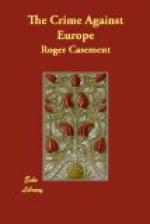The remainder, more than L10,000,000, although the market it was seeking lay chiefly to the West, had to be shipped East into and to pay a heavy transit toll to that country for discharge, handling, agency, commission, and reloading on British vessels in British ports to steam back past the shores of Ireland it had just left. While Ireland, indeed, lies in the “line of trade,” between all Northern Europe and the great world markets, she has been robbed of her trade and artificially deprived of the very position assigned to her by nature in the great tides of commercial intercourse. It is not only the geographical situation and the trade and wealth of Ireland that England has laid hands on for her own aggrandizement, but she has also appropriated to her own ends the physical manhood of the island. Just as the commerce has been forcibly annexed and diverted from its natural trend, so the youth of Ireland has been fraudulently appropriated and diverted from the defence of their own land to the extension of the power and wealth of the realm that impoverished it at home. The physical qualities of the Irish were no less valuable than “Irish wool” to Empire building, provided always they were not displayed in Ireland.
So long ago as 1613 we find a candid admission in the State papers that the Irish were the better men in the field. “The next rebellion whenever it shall happen, doth threaten more danger to the State than any heretofore, when the cities and walled towns were always faithful; (1) because they have the same bodies they ever had and therein they had and have advantage of us; (2) from infancy they have been and are exercised in the use of arms; (3) the realm by reason of the long peace was never so full of youths; (4) that they are better soldiers than heretofore, their continental employment in wars abroad assures us, and they do conceive that their men are better than ours.”
This testimony to Irish superiority, coming as it does from English official sources just three hundred years ago, would be convincing enough did it stand alone. But it is again and again reaffirmed by English commanders themselves as the reason for their failure in some particular enterprise. In all else they were superior to the Irish; in arms, armaments, munitions, supplies of food and money, here the long purse, settled organization and greater commerce of England, gave her an overwhelming advantage. Moreover the English lacked the moral restraints that imposed so severe a handicap on the Irish in their resistance. They owned no scruple of conscience in committing any crime that served their purpose. Beaten often in open fight by the hardier bodies, stouter arms and greater courage of the Irishmen, they nevertheless won the game by recourse to means that no Irishman, save he who had joined them for purposes of revenge or in pursuit of selfish personal aims, could possibly have adopted. The fight from the first was an unequal one. Irish valour, chivalry, and personal strength were matched against wealth, treachery and cunning. The Irish better bodies were overcome by the worse hearts. As Curran put it in 1817—“The triumph of England over Ireland is the triumph of guilt over innocence.”




